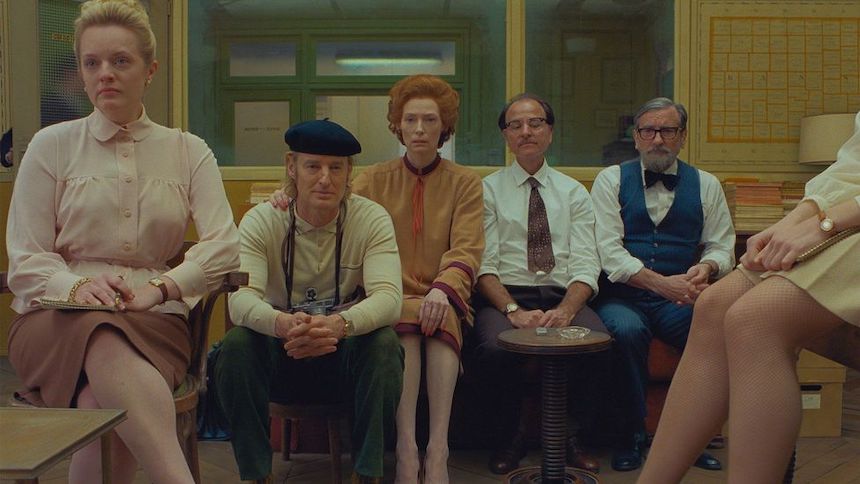Review: THE FRENCH DISPATCH, Delightful, Wonderful Ode to Mid-Century Journalism

To call Wes Anderson (Isle of Dogs, The Grand Budapest Hotel, Moonrise Kingdom, The Royal Tenenbaums) an auteurist filmmaker with a singular, uncompromising vision doesn’t come close to describing the moment-by-moment, shot-by-shot experience of sitting through one of Wes Anderson's films.
He’s a world-builder without equal, a fantasist, and fabulist who obsessively crafts slyly subversive meta-fictions tuned into his peculiar sensibilities. Anderson’s work combines minimalist camerawork with maximalist production design (often dismissed or denigrated for their dollhouse constructions), and archly dry, deadpan dialogue delivered by a closely knit group of rep players on Anderson’s rarefied wavelength.
Like most auteurist filmmakers, though, Anderson and his oeuvre are an acquired taste, a taste that some filmgoers, despite their best efforts, never truly develop. For others, as always, visual and auditory wonders and delights await.
Anderson’s latest film, The French Dispatch (officially The French Dispatch of the Liberty, Kansas Evening Sun), certainly won’t change any minds, but for anyone who adored and/or loved The Grand Budapest Hotel, its dizzying nested storytelling, its brightly colored, meticulous production design, and quirkily befuddled strivers, hangers-on, and survivors, offers more of the same, except (slightly different), focusing this time not on a post-WWII European hotel and its eccentrically endearing denizens, but on a fictional, post-WWII foreign bureau, its New Yorker-inspired magazine, and, in a nod to the ever shifting tides of taste and time, to the last issue as the eponymous magazine closes its doors for the final time.
An ode to the long-gone New Yorker of the mid- to late-20th-century and the long-form, personal storytelling that centered creative writers in the stories and the tellings as much as the subject matter itself, The French Dispatch follows lead editor and publisher, Arthur Howitzer, Jr. (Bill Murray), and his carefully selected team of writers, editors, illustrators, and designers as they put together the last issue. Each story receives its own onscreen splash page complete with elegantly chosen typefaces before burrowing deep into recreating each story visually, first, in what seems like a throwaway, segment, through the eyes and ears of Herbsaint Sazerac (Owen Wilson), a travel writer and our host on a biking trip through the charming home-city of the foreign bureau, Ennui-sur-Blasé (mostly Angoulême, France), before segueing to the stories proper.
In the first segment, “The Concrete Masterpiece,” an art lecturer and French Dispatch writer, J.K.L. Berensen (Tilda Swinton), recounts a logic-stretching story involving a murderous, perpetually bearded convict, Moses Rosenthaler (Benicio Del Toro), Rosenthaler’s jailer and muse, Simone (Léa Seydoux), and an ex-felon and art dealer, Julian Cadazio (Adrien Brody), with an eye for abstract, modernist art. Along the way, Anderson and his writing partners, Roman Coppola, Hugo Guinness, and Jason Schwartzman, take a few broad, if no less hilarious, swipes at the ambitions and pretensions of the art world where “understanding” art is far less important than whether you can convince a wealthy Midwestern art collector to purchase Rosenthaler’s long-in-the-making work-of-art, the same work-of-art that Rosenthaler decided to paint on the walls of the penitentiary where he's spent most of his adult life.
The second segment, “Revisions of a Manifesto,” lightly ventures into the radical politics and student protests of May 1968, as another writer, Lucinda Krementz (Frances McDormand), finds herself semi-romantically involved with a student protest leader, Zeffirelli B. (Timothée Chalamet), and the grand cause of coed dormitories. A smug, entitled, self-styled revolutionary, Zeffirelli B. drafts the presumably radical manifesto of the title, but Krementz, a writer and editor first and foremost, can’t help herself, revising Zeffirelli B.’s never revealed manifesto while becoming personally involved with both Zeffirelli B. and the student protests, throwing out any pretensions of journalistic objectivity or distancing out the proverbial dorm window. A hero in his own, pre-adult mind, but a naive child to everyone else, Zeffirelli B. ultimately emerges as another Anderson-style, tragic-comic hero, the victim of his own hubris.
The third, equally meaty segment, “The Private Dining Room of the Police Commissioner,” centers on the absurdly named Roebuck Wright (Jeffrey Wright), a James Baldwin-inspired epicurean imbued with a verbal profligacy without equal. In a TV interview with an unnamed presenter and host Liev Schreiber), Wright takes a deep dive into one of his most famous stories involving a food-obsessed senior police official (Mathieu Amalric), his exceptional, preternatural preteen son, Gigi (Winston Ait Hellal), a police chef without equal, Nescaffier (Stephen Park), and and unnamed chauffeur (Edward Norton), who engineers Gigi’s kidnapping, turning what started as a simple dinner engagement into a city-wide police effort to safely recover Gigi with Wright along for a wild, farcical ride that includes not only the usual switch from black-and-white stock to color and back again or changing aspect ratios, but a lengthy animated sequence that doubles as homage to the New Yorker’s illustrators.
With its multi-layered, meta-fictional structure, storytellers prone to embellishment and invention, and Anderson’s daft, energetic visual style -- Anderson gets more out of seemingly simple tracking shots and push-ins than the vast majority of filmmakers do using the full arsenal of modern filmmaking -- The French Dispatch delivers an overabundance of visual splendors and auditory pleasures, specifically from a career-best score composed by Alexandre Desplat, though, as always, Anderson’s tonal approach (twee, quirky, etc.) will be off-putting for some moviegoers who expect or want something more decisively dramatic or comedic, rather than something somewhere in the middle where a light, comic approach can be misinterpreted as superficial, slight, or ultimately, alienating.
The French Dispatch opens in theaters today (Friday, October 22) via Searchlight Pictures. Visit the official site for more information.
The French Dispatch
Director(s)
- Wes Anderson
Writer(s)
- Wes Anderson
- Jason Schwartzman
- Roman Coppola
Cast
- Léa Seydoux
- Timothée Chalamet
- Christoph Waltz







